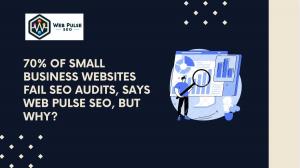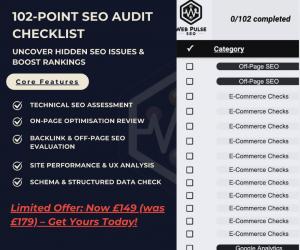70%+ Small Businesses Sites Fail SEO Audits: Web Pulse SEO Shows Costly Errors
New diagnostic audit service from Web Pulse SEO exposes common ranking issues holding small businesses back from online growth.
COVENTRY, WEST MIDLANDS, UNITED KINGDOM, May 19, 2025 /EINPresswire.com/ -- 1. The Digital Visibility Crisis Facing Small Businesses
A significant number of small business websites are failing to meet even the most basic SEO standards, resulting in poor visibility across search engines. Recent industry analysis shows that over 70% of small business websites fail fundamental SEO audits, including missing meta tags, broken internal links, crawlability issues, and slow site speed, all of which directly impact Google rankings.
For many small business owners, SEO remains an afterthought, often due to a lack of awareness or the misconception that “having a website is enough.
”But without proper optimisation, these websites remain buried in search results, unseen by the customers they aim to attract. In competitive local and niche markets, this invisibility can lead to thousands in lost traffic and sales each year.
Even businesses that invest in digital marketing often overlook foundational technical SEO, assuming their web developer or CMS platform has taken care of it. In reality, most templated sites and plugins only scratch the surface, leaving major performance gaps unnoticed until they’re flagged in a proper SEO audit.
2. Common SEO Audit Failures That Go Unnoticed
When Web Pulse SEO conducts a diagnostic audit, the same technical and on-page issues consistently appear, regardless of industry. The most frequent problems include:
● Unoptimised title tags and meta descriptions that fail to target relevant keywords.
● Missing or incorrect canonical tags, leading to duplicate content penalties.
● Poor site architecture that hinders crawlability and internal link flow.
● Broken links and 404 errors, damaging both UX and crawl efficiency.
● Slow-loading mobile pages, especially on under-optimised WordPress themes.
● No structured data, making it harder for search engines to understand content hierarchy.
● Thin and dead pages, these pages are indexed, have little content, not optimised for any keyword in mind and have just been created on a whim without any competitor analysis or thought.
These issues may seem minor individually, but together they create a systemic failure that prevents small businesses from ranking well. More importantly, these aren’t problems that surface without structured analysis, they require a proper SEO audit service to diagnose and prioritise.
3. Introducing Web Pulse SEO’s Diagnostic SEO Audit Service
To help business owners uncover and fix these critical issues, Web Pulse SEO offers a comprehensive diagnostic SEO audit specifically designed for small businesses. Unlike generic automated reports, this audit combines technical precision with human insight, identifying not only what’s broken, but why it matters and how to fix it.
The audit covers 102 key SEO health checks across technical SEO, on-page elements, site speed, mobile usability, and content structure and more. Each issue is clearly prioritised based on its potential impact on rankings and visibility. This ensures business owners receive actionable steps, not vague recommendations.
For SMEs without an in-house SEO team, this service acts as a blueprint for recovery and growth, whether they’re relaunching a site, seeing traffic plateau, or recovering from an algorithm update.
4. A Proven Framework: The 102-Point SEO Audit Checklist
At the core of every audit conducted by Web Pulse SEO is the proprietary 102-Point SEO Audit Checklist. Developed specifically for small and growing businesses, this framework ensures no critical SEO element is overlooked.
The checklist spans five key pillars:
● Technical SEO – covering indexability, crawl health, and site performance.
● On-Page SEO – analysing keyword targeting, title structure, headers, and content relevance.
● Off-Page SEO - checking backlink quality, are they relevant or toxic and comparing against direct page 1 competitors, do you need more high quality links?
● Google Search Console – making sure all important pages are indexed, performance of core pages through the eyes of Google.
● Google Analytics – identifying if key events are being tracked correctly and utilised to evaluate business performance.
● Web Design – Are your lead generation pages designed to convert with compelling CTA’s and header and footer navigations optimised to funnel crawl bots and users.
This methodical approach gives small business owners clarity, replacing guesswork with measurable, prioritised improvements. Whether implemented in-house or by a developer, the checklist empowers smarter decisions with SEO at the foundation.
5. Why Small Business Owners Can’t Afford to Ignore SEO
For many small businesses, organic search is the primary source of long-term, sustainable traffic. Yet without proper SEO, even well-designed websites remain invisible on Google relying solely on word-of-mouth or paid ads to survive.
Ignoring SEO doesn’t just mean lost rankings, it means lost revenue. A local service business ranking on page two is effectively invisible to most customers, who rarely click beyond the top results. Over time, competitors who invest in search optimisation steadily absorb that missed traffic.
Moreover, the longer issues go unresolved, the harder they become to fix. Broken indexing, weak content structure, or poor internal linking can lead to years of underperformance without the business owner ever knowing why.
A thorough audit not only exposes these hidden problems, it provides a roadmap to recover and compete.
6. Web Pulse SEO’s Commitment to Small Business Growth
At Web Pulse SEO, the mission is simple: to make enterprise-level SEO insight accessible to small businesses that need it most. The company’s diagnostic audits and SEO audit services are tailored to the needs, and budgets of local businesses, trades, ecommerce stores, and service providers.
With clear reporting, prioritised actions, and a transparent process, Web Pulse SEO equips business owners with the clarity they need to take control of their online visibility. Whether you're just launching a website or wondering why your traffic has flatlined, the audit is a smart first step.
For those ready to understand exactly what’s holding their site back, the 102-Point SEO Audit Checklist is available as a DIY guide, or can be paired with a full professional audit for deeper analysis.
To learn more or schedule an audit, visit Web Pulse SEO.
Adam Green
Web Pulse SEO
+442477360310 ext.
hello@webpulseseo.co.uk
Visit us on social media:
LinkedIn
Facebook
YouTube
X
Legal Disclaimer:
EIN Presswire provides this news content "as is" without warranty of any kind. We do not accept any responsibility or liability for the accuracy, content, images, videos, licenses, completeness, legality, or reliability of the information contained in this article. If you have any complaints or copyright issues related to this article, kindly contact the author above.
Happy Father's Day - Training Sons to become responsible fathers
Thorncrest Dental Brings Advanced Laser Dentistry to Etobicoke with Picasso Soft Tissue Laser
Tom Jackobs Offers Fractional Sales Management for Heart-Led Wellness Practices
Kalendarium
Więcej ważnych informacji
 Jedynka Newserii
Jedynka Newserii

 Jedynka Newserii
Jedynka Newserii

Prawo

Trwają dyskusje nad kształtem unijnego budżetu na lata 2028–2034. Mogą być rozbieżności w kwestii Funduszu Spójności czy dopłat dla rolników
Trwają prace nad wieloletnimi unijnymi ramami finansowymi (WRF), które określą priorytety wydatków UE na lata 2028–2034. W maju Parlament Europejski przegłosował rezolucję w sprawie swojego stanowiska w tej sprawie. Postulaty europarlamentarzystów mają zostać uwzględnione we wniosku Komisji Europejskiej w sprawie WRF, który zostanie opublikowany w lipcu 2025 roku. Wciąż jednak nie ma zgody miedzy państwami członkowskimi, m.in. w zakresie Funduszu Spójności czy budżetu na rolnictwo.
Konsument
35 proc. gospodarstw domowych nie stać na zakup mieszkania nawet na kredyt. Pomóc może wsparcie budownictwa społecznego i uwolnienie gruntów pod zabudowę

W Polsce co roku oddaje się do użytku ok. 200 tys. mieszkań, co oznacza, że w ciągu dekady teoretycznie potrzeby mieszkaniowe społeczeństwa mogłyby zostać zaspokojone. Jednak większość lokali budują deweloperzy na sprzedaż, a 35 proc. gospodarstw domowych nie stać na zakup nawet za pomocą kredytu. Jednocześnie ta grupa zarabia za dużo, by korzystać z mieszkania socjalnego i komunalnego. Zdaniem prof. Bartłomieja Marony z UEK zmniejszeniu skali problemu zaradzić może wyłącznie większa skala budownictwa społecznego zamiast wspierania kolejnymi programami zaciągania kredytów.
Problemy społeczne
Hejt w sieci dotyka coraz więcej dzieci w wieku szkolnym. Rzadko mówią o tym dorosłym

Coraz większa grupa dzieci zaczyna korzystać z internetu już w wieku siedmiu–ośmiu lat – wynika z raportu NASK „Nastolatki 3.0”. Wtedy też stykają się po raz pierwszy z hejtem, którego jest coraz więcej w mediach społecznościowych. Według raportu NASK ponad 2/3 młodych internautów uważa, że mowa nienawiści jest największym problemem w sieci. Co więcej, dzieci rzadko mówią o takich incydentach dorosłym, dlatego tym istotniejsze są narzędzia technologiczne służące ochronie najmłodszych.
Partner serwisu
Szkolenia

Akademia Newserii
Akademia Newserii to projekt, w ramach którego najlepsi polscy dziennikarze biznesowi, giełdowi oraz lifestylowi, a także szkoleniowcy z wieloletnim doświadczeniem dzielą się swoją wiedzą nt. pracy z mediami.











.gif)

 |
| |
| |
|